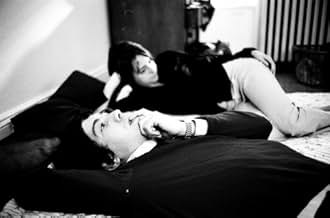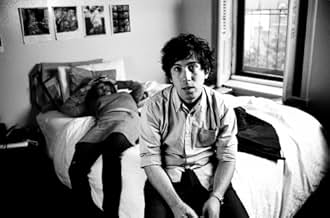VALUTAZIONE IMDb
6,7/10
2016
LA TUA VALUTAZIONE
Aggiungi una trama nella tua linguaAlan is a musician who leaves a busted-up band for New York, and a new musical voyage. He tries to stay focused and fends off all manner of distractions, including the attraction to his good... Leggi tuttoAlan is a musician who leaves a busted-up band for New York, and a new musical voyage. He tries to stay focused and fends off all manner of distractions, including the attraction to his good friend's girlfriend.Alan is a musician who leaves a busted-up band for New York, and a new musical voyage. He tries to stay focused and fends off all manner of distractions, including the attraction to his good friend's girlfriend.
- Regia
- Sceneggiatura
- Star
- Premi
- 2 vittorie e 3 candidature totali
Damian Hess
- Clay Loudermilk
- (non citato nei titoli originali)
Recensioni in evidenza
Painful awkwardness
it's a real problem. Bujalski masterfully uncovers a new generation of college graduates that probably seems all too familiar to some. The film captures moments of social anxiety that come from a generation of sheltered upper middle class graduates. The security of a sheltered life comes with a price: these people have no idea how to express emotions and talk about anything beyond mundane daily happenings unless, as Ellie says, they are fed multiple beers. When Ellie and Alan admit a mutual attraction for each other on the bed, they have absolutely no idea how to realize it. All Alan can do is hilariously and timidly rub Ellie's arm. Instead, Ellie simply goes back to a boyfriend that doesn't even experience a mood shift when Ellie tells him he is attracted to his best friend, and they had a very vague "moment". Are we finally seeing the consequences of not letting youth experience anything for themselves? Are these people victims of their upbringing or is it their own fault, or both? I sat there watching the film feeling entirely uncomfortable, which is why the film worked so well. The silence in the air often made me cringe, which created completely hilarious moments when the characters finally responded with confused, inarticulate comments: "I can't even do that thing where you're not my girlfriend and I'm making out with you". I was scared to watch the movie, because I was afraid it would remind me of my own post college life. Some moments did hit close to home for me, and I found myself reflecting on my own life as well as the characters in the film. This film is scary and funny at the same time. It reminds us to wake up, but to also realize that life is full of awkward moments and sometimes all there is to do is laugh at them. I saw this film at Chicago's Music Box, and suggest that everyone do the same before the film is gone from the theater.
I think a film like Mutual Appreciation and films in general akin to Mutual Appreciation will more often than not get a bit of a sigh from its audience following the first five minutes, possibly followed by a rolling of the eyes. But while certain experiments can go wrong when it comes to film, I don't think Mutual Appreciation is a film to be sniffed at. Its really low budget and the fact it goes a for a pretty long runtime considering what conditions these people are making it under add to the overall experience of watching a film as guerrilla style and as unordinary as this one but the most surprising thing I found was just how interested I really was as these scenes and this runtime were totalling up.
Mutual Appreciation is a film about students, made by students. It carries all those tags you'd associated with the young, the up-coming and the adventurous in the sense there are lots of long takes; there's dialogue that doesn't revolve around anything and the makers are using people they probably picked off the street for locations that are their own homes the film even gives us a few well shot scenes on actual streets but not in the cornered off, Hollywood sense where lots of extras make up the background and a police presence stops anything going wrong, oh no: this is neo-realism, out on the roads, with self-motivated written permission for filming and everything else that comes with it.
I guess we've all attempted to make a film at one point in our lives. For some, it becomes careers; for others it is limited to a brief recording of a friend or loved one on a holiday via a camera phone or a recording of an event such as a wedding or birthday party, the ultimate 'home movie'. But Mutual Appreciation is a 'home movie' of sorts that relies on people in a fictional yet realistic situation attempting to, at the film's core, find who they are and where they belong with what they belong doing following up as a sort of sub-theme. Conversations can take place in houses or flats; on city streets or in cars and can revolve around anything in particular like the size of a mole on someone's body to the meaningless chit-chat that occurs between a band member and the host before a live musical performance.
But the truly scary thing about the dialogue is just how good it is or just how interesting it is when it's trying to be smart and carry substance. The host of the musical performance owns a cinematic space that is vastly the superior of all the other locations, especially ones that dictate where certain characters live. In his kitchen, primary characters Alan (Rice) and Sera (Lee) will have an uneasy conversation that will have you flinch somewhat to do with their relationship it does not help matters that the preceding scenes had her in a flirtatious mindset with the host of both the apartment.
But as I say, the film's focus is on these people and where they fit into society. Alan seems to be chasing a musical fondness of some sort but must negotiate girls in the process as well as his father's constant wish for him to earn money to help for more immediate issues. The film gives us splashes of other people. Lawrence, played by Andrew Bujalski the film's writer/director gives advice in his own little room to a girl who is requesting help for male read monologues, something that has no bearing on the overall film but does pop up later on reminding us of this earlier exchange. The point here being that whilst not necessarily demanding an 'art' label, the film proves it is able to deliver a nicely written scene in which one character will help another through good dialogue good dialogue being pretty much the only thing films like this have initially: they don't have much money for special effect or acting talent and cannot give us lush locations and fancy visual aids but anybody can write a page of dialogue on anything. Mutual Appreciation takes advantage of this one factor.
Going on from the scenes that do work through attention to substance, Alan's immediate life is focused upon following the leaving of the host's flat following the musical performance. He visits a girl with whom he is friends and nothing more. He has left the previous apartment with his female 'partner' still there after going through a minor break-up with someone who came onto him and witnessing her flirtatious activity. In the new location, he is relegated once more and his manhood jeopardised when the female host and her female friends convince him to dress up in female clothing this relegating him further into a sort of metaphorical mire of embarrassment and failure to control a situation when activity involving multiple genders threaten to escalate out of Alan's control he has failed again.
But Alan's voyage around a night time urban location does not go on for too long and the theory reading has to stop after this scene; this is not Mike Leigh's 1993 film Naked after all. But what it is is an interesting and somewhat unique look at life in America round about now as a young adult or late teen. When issues of sex and relationships arise they are not dealt with in a childish 'American Pie' manner but are constructed and developed - not a film for all but I got a mild kick out of it.
Mutual Appreciation is a film about students, made by students. It carries all those tags you'd associated with the young, the up-coming and the adventurous in the sense there are lots of long takes; there's dialogue that doesn't revolve around anything and the makers are using people they probably picked off the street for locations that are their own homes the film even gives us a few well shot scenes on actual streets but not in the cornered off, Hollywood sense where lots of extras make up the background and a police presence stops anything going wrong, oh no: this is neo-realism, out on the roads, with self-motivated written permission for filming and everything else that comes with it.
I guess we've all attempted to make a film at one point in our lives. For some, it becomes careers; for others it is limited to a brief recording of a friend or loved one on a holiday via a camera phone or a recording of an event such as a wedding or birthday party, the ultimate 'home movie'. But Mutual Appreciation is a 'home movie' of sorts that relies on people in a fictional yet realistic situation attempting to, at the film's core, find who they are and where they belong with what they belong doing following up as a sort of sub-theme. Conversations can take place in houses or flats; on city streets or in cars and can revolve around anything in particular like the size of a mole on someone's body to the meaningless chit-chat that occurs between a band member and the host before a live musical performance.
But the truly scary thing about the dialogue is just how good it is or just how interesting it is when it's trying to be smart and carry substance. The host of the musical performance owns a cinematic space that is vastly the superior of all the other locations, especially ones that dictate where certain characters live. In his kitchen, primary characters Alan (Rice) and Sera (Lee) will have an uneasy conversation that will have you flinch somewhat to do with their relationship it does not help matters that the preceding scenes had her in a flirtatious mindset with the host of both the apartment.
But as I say, the film's focus is on these people and where they fit into society. Alan seems to be chasing a musical fondness of some sort but must negotiate girls in the process as well as his father's constant wish for him to earn money to help for more immediate issues. The film gives us splashes of other people. Lawrence, played by Andrew Bujalski the film's writer/director gives advice in his own little room to a girl who is requesting help for male read monologues, something that has no bearing on the overall film but does pop up later on reminding us of this earlier exchange. The point here being that whilst not necessarily demanding an 'art' label, the film proves it is able to deliver a nicely written scene in which one character will help another through good dialogue good dialogue being pretty much the only thing films like this have initially: they don't have much money for special effect or acting talent and cannot give us lush locations and fancy visual aids but anybody can write a page of dialogue on anything. Mutual Appreciation takes advantage of this one factor.
Going on from the scenes that do work through attention to substance, Alan's immediate life is focused upon following the leaving of the host's flat following the musical performance. He visits a girl with whom he is friends and nothing more. He has left the previous apartment with his female 'partner' still there after going through a minor break-up with someone who came onto him and witnessing her flirtatious activity. In the new location, he is relegated once more and his manhood jeopardised when the female host and her female friends convince him to dress up in female clothing this relegating him further into a sort of metaphorical mire of embarrassment and failure to control a situation when activity involving multiple genders threaten to escalate out of Alan's control he has failed again.
But Alan's voyage around a night time urban location does not go on for too long and the theory reading has to stop after this scene; this is not Mike Leigh's 1993 film Naked after all. But what it is is an interesting and somewhat unique look at life in America round about now as a young adult or late teen. When issues of sex and relationships arise they are not dealt with in a childish 'American Pie' manner but are constructed and developed - not a film for all but I got a mild kick out of it.
I bet Andrew Bujalski is sick of reading that he's the voice of his generation, when most of that neo-slacker demographic has never had the opportunity to see his films. Like Funny Ha Ha, Mutual Appreciation is hardly your standard Amerindie
It's shot on 16mm black-and-white, thus confirming Bujalski's allegiance to a strain of maverick filmsShadows, Stranger than Paradise, Clerksthat bring poignantly accurate renditions of subcultures of which their directors have intimate knowledge to otherwise homogenized screens. While Cassavetes is the most obvious influence, one might also regard Funny Ha Ha and Mutual Appreciationas Rohmer without subtitles. Both films are "moral tales" whose characters leap to language as offense and defense.Amy Taubin
Without condemning the whole mumblecore movement, I think I sympathise more with its critics than its fans. The films certainly convey relationships between their characters realistically, and there are some scenes in each mumblecore film I've seen which I could almost recognise for myself, but I'm always overwhelmed by this slightly smug self-awareness that pervades many artists working under the 'indie' banner. It is easy to believe that the makers of these films are very similar to their characters young, confused, directionless but the fact that the focus most often falls on the progeny of the last bourgeois generation takes away the integrity of this gritty, frugal filming style.
Mutual Appreciation is as much a milestone of indie film-making as it is a victim of its own pretences. The observer paradox seems to pervade much of the dialogue, much of which feels calculatingly awkward it is easy to distinguish between the improvised lines and premeditated lines. Having said that, I was struck by one scene where Alan is besieged by with women at a 'party' he wasn't certain about going to in the first place, and is eventually convinced to don a dress and make-up. Here it seems the actors were given the most room to ad-lib, and it's a brilliant piece of footage which seems to speak to the majority of young adults and their issues with projecting identity.
Mutual Appreciation is as much a milestone of indie film-making as it is a victim of its own pretences. The observer paradox seems to pervade much of the dialogue, much of which feels calculatingly awkward it is easy to distinguish between the improvised lines and premeditated lines. Having said that, I was struck by one scene where Alan is besieged by with women at a 'party' he wasn't certain about going to in the first place, and is eventually convinced to don a dress and make-up. Here it seems the actors were given the most room to ad-lib, and it's a brilliant piece of footage which seems to speak to the majority of young adults and their issues with projecting identity.
I saw Mutual Appreciation on the bottom row of a 'new release' section of a movie shop and it caught my eye. I usually am a sucker for movies that are deeper than the average celluloid we are bombarded with. I didn't have a great expectation for the movie, which turned out to be great. The dialog isn't deep. And it isn't meant to be. It's very real to life. The colours and positioning really captured the essence of the movie: bleak and monotonous. I did like it for the fact I felt that I could relate to more than one character, and the characters were realistic and likable. I've read previous remarks, and I suppose the only advice I can give is to watch the movie without expectations and with a open mind. On reflection, try and see if you can relate some of the central themes to your life and you will be pleasantly surprised. As a 16 year old that is trying to find movies that break the conventional mould, I found this refreshing and it made me hopeful for some reason. I will definitely be checking out Funny Ha Ha.
Lo sapevi?
- ConnessioniSpin-off Peoples House (2007)
I più visti
Accedi per valutare e creare un elenco di titoli salvati per ottenere consigli personalizzati
Dettagli
Botteghino
- Lordo Stati Uniti e Canada
- 103.509 USD
- Fine settimana di apertura Stati Uniti e Canada
- 13.141 USD
- 3 set 2006
- Lordo in tutto il mondo
- 121.292 USD
- Tempo di esecuzione
- 1h 49min(109 min)
- Colore
- Proporzioni
- 1.66 : 1
Contribuisci a questa pagina
Suggerisci una modifica o aggiungi i contenuti mancanti























